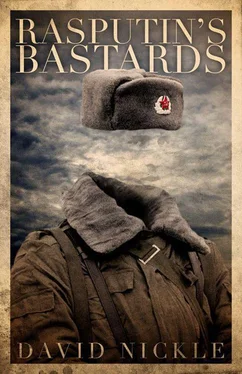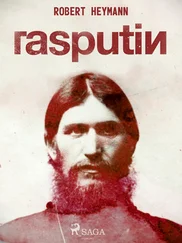“All right,” said Stephen, “so the newborn baby got a good look at you, figured out your name, and then he spoke inside your head. And his first words were, ‘I’m sorry.’ What was he sorry for?”
“As it turned out, pretty much everything,” said Ilyich. “But immediately, he was sorry for having used me to establish this base of operations; for siphoning Zhanna’s pain of childbirth; for robbing me of my time and my money. Plenty to apologize for.”
“But he didn’t let you free.”
“Oh yes — that was to be the bargain. As he suckled at his mother, he told me I could leave any time I wanted to. But he asked me if I would stay and help him and the others finish their work.”
“And you agreed.”
“Yes,” said Uzimeri. “We all agreed, boy. Because we saw the light of Vladimir. We—”
Ilyich raised his hand, and Uzimeri nodded. He shut his mouth, and Ilyich continued.
“There were eighteen children with Zhanna and Vladimir. They were siblings. They ranged from three years old to eighteen. The closest thing they had to a parent was Zhanna — and she was their sister. It was hard at first to learn much about them. They rarely spoke, although they didn’t seem to have much trouble communicating with one another. Mostly I spoke with Zhanna and Vladimir — and that was mainly to take instruction: ‘Bring us groceries, Chenko’; ‘We require medicine, Chenko’; ‘What can you do about some new clothes, Chenko?’ That kind of thing. The rest of the children kept to their rooms — staring at one another and occasionally nodding or shaking a head.”
Stephen nodded himself now. “Discourse,” he said.
“Yes. They were engaged in what you call Discourse. It was two months before they introduced me to it. It was an icy November night, and I was frustrated. My superiors in Moscow were raising questions about the apartment block and some other unauthorized purchases I’d made. There was talk of replacing me in Odessa, with someone more reliable. I’d just received news of this, through a contact of mine in the Kremlin. The children, when I arrived, were sitting in a tight circle underneath a frosted skylight — hands joined and eyes shut. Vladimir was in the middle, apparently asleep. Zhanna met me at the door and pulled me aside.
“‘This is private business, Ilyich,’ she said. ‘Go away.’
“I am afraid that I became very angry. I said all kinds of things, all of which boiled down to this: that I may indeed go away, to someplace where none of them would see me anymore, because of the resources that the group of them demanded.
“‘You use me like a bank,’ I said. ‘And what do you give in return? I’ve a mind to leave right now. Make my way in America, perhaps.’
“For the first time since I’d met her, Zhanna looked genuinely alarmed. She pulled me to a side bedroom and sat me down on the bed. ‘You cannot mean that,’ she said.
“Of course, I did not mean that — I couldn’t. The children exerted a force on me even then. But I was angry and Zhanna saw that, and she decided then to appease me.
“‘Lie down,’ she commanded. ‘Loosen your belt. Unbutton your shirt collar. Remove your shoes. And close your eyes.’
“I did as I was told — although I had no idea what to expect. I admit, the idea that Zhanna might make love to me crossed my mind. But I knew in my heart that this was not in her plans. She wanted to show me something else. Something — greater.”
Uzimeri set his cutlery down and looked heavenward. Tanya and Stephen shared a glance.
“Discourse,” said Ilyich. “Zhanna set about to show me the raw magnificence of Discourse.”
Stephen sighed. Of course she was. “What was it like?” he asked.
Ilyich was ready with a description. “Like a drug,” he said. “Like a drug that lets you listen to a stadium full of chattering grandmothers — and hear what each of them is saying.”
“No,” said Uzimeri. “That’s not entirely right. You are not hearing what they are saying — you are feeling it. In your soul!” He thumped his chest. “Discourse is the language of the Soul!”
“Konstantine,” Tanya said, “the children do not even admit the existence of a soul. You only feel what you imagine you feel. The Discourse is entirely physical—”
“—and yet,” said Ilyich, “it brings such a great sense of peace to us when we are permitted to enter it. And the visions — I haven’t even begun with the visions yet.”
“You see?” said Uzimeri to Tanya. “Visions. Visions! A thing of the soul.”
“A thing of the optic nerve,” said Tanya.
“Why does this always have to get theological with you two?” said Ilyich. “Cannot we accept the truth and value of inner peace without attaching a religious connotation to the experience?”
“Who said anything about religion?” said Uzimeri.
“Oh, come on,” began Tanya. “You haven’t said anything else since—”
Mrs. Kontos-Wu started to rise. “E-excuse me,” she said.
“Of course.” Uzimeri slid out from his seat to let Mrs. Kontos-Wu pass. She hurried away to aft, down the corridor. The sounds of her sobs echoed off the bulkheads.
It was finally Tanya who broke the silence around the table.
“It is difficult,” she said, “for all of us at first.”
Whatever their intentions may have been at the beginning of the day, after dinner, none of them — not Mrs. Kontos-Wu, not Uzimeri nor Chenko nor Pitovovich — seemed inclined to bring Stephen any more up to speed. So that night, Stephen decided to take the matter into his own hands. He went to see the Children.
They were holed up in the officer’s section. It wasn’t far — nothing was far on the antique Russian submarine — but it felt to Stephen as though he were passing through a time zone when he stepped through the round hatchway and into the wood-panelled corridor leading to the Captain’s suite. They’d placed one of their Romanian monks there as a guard, and Stephen half-expected trouble from him. But he just looked at Stephen, nodded, and said in imperfect Russian: “Go on through. Zhanna is expecting you. Third hatch on left.”
Stephen passed four rooms before Zhanna’s, each one open — each with a small form swaddled in thick wool blankets on the narrow bed. They weren’t really that small. Zhanna’s crew of “children” were mostly in their teens. Over the course of his stay, he’d seen two of them — but understood there were seven that had stayed behind on the submarine after the encounter with Shadak’s boat in the Atlantic. The children all seemed to be sleeping now — one, a heavyset boy with his hair cut very short, lay on his back snoring softly as Stephen tiptoed past.
He had no trouble finding Zhanna’s cabin. Light from it painted a sickly yellow square on the opposite side of the corridor. Zhanna was sitting up at the room’s little desk. She smiled at Stephen when he appeared in the doorway.
“Not a step further,” she said.
“All right.” He raised his hands palm outward. “I’ll stay here.”
“Good. Because you know, if you think you can pull anything — I’ve got a man in the cabin behind you and to fore with a gun aimed at your back. Go ahead — look.”
“A gun in a submarine?” Stephen turned around and peered into the cabin across the hall. A man peered back at him with glassy, determined eyes. He held an old Russian automatic pistol, aimed straight at Stephen’s chest. “You sure that’s wise?”
“I don’t expect to have to use it,” said the man, his deep voice taking on the accent and cadence of Zhanna’s. “Just don’t get any ideas.”
“Why would I get any ideas?”
The Romanian meat puppet continued: “You’re the right hand of the evil bastard Fyodor Kolyokov; you’ve received instructions from him, from the lips of his operative Mrs. Kontos-Wu, to deal with us and bring us home to him; you are a young man — and I, I am told, am a beautiful woman who many men desire. And I cannot see your thoughts to put my mind at ease on any of these things. So I am taking a precaution.”
Читать дальше












